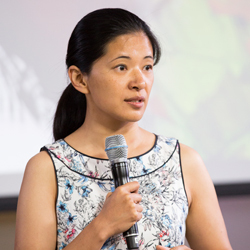If you're like me, this morning you woke up, brushed your teeth, and jumped in the shower-- a familiar and thoroughly uneventful routine.
Washing, cooking, and drinking with clean water from your tap at home is such a basic part of our lives that many of us barely give it a second thought.
For mothers like 27-year-old Ana, such a morning would be a new experience. She lives in the largest city in Niger, a small landlocked nation in West Africa. Ana is just one of the 40 percent of the city's population that do not have a household water connection - meaning she has no running water in her home.
Ana and her husband, Hamadou, are entrepreneurs. They provide for their five children through their family-run businesses, using their self-taught skills at every opportunity. Ana mends clothes for her neighbors and makes pastries to sell at the market, while Hama helps to repair cars between stints as a driver.
A utility pipe runs just outside their home, but despite their work ethic, saving enough money to afford a household connection is difficult - it costs three months of their combined income.
They have ups and downs like every family, but getting connected to the utility is always just out of reach. In fact, it is so close that the "last mile" of utility-piped water distribution is literally only the last 20 yards for Ana's household.
Some of Ana's neighbors are connected to the water utility, but encounter their own setbacks. They have no way of knowing how much water they use each month, and so they struggle to pay surprise bills. These families end up in a constant battle with the utility to stay connected.
The irregular incomes of Ana and her neighbors means they obtain their water from public taps or water resellers.
The problem with these alternatives is that they're up to 15 times more expensive, and are literally far-fetched - Ana and her daughters lose up to two hours each day just to get water - precious time away from work, school and their families.
Even worse, the water quality is often questionable, as water is re-contaminated during transportation in jerrycans, meaning these families get sick from preventable waterborne illnesses.
This problem is not unique to Niger - it's the daily reality for 827 million people living in cities in the developing world today.
And utilities are only too aware of this issue. They struggle with their mandate to serve everyone, and face a constant battle with non-revenue water (NRW) due to their aging infrastructure - water that costs money to produce but is not sold: it's lost to leaks, theft, and poor metering.
Add in customer delinquency rates as high as 50% and old-fashioned, labour-intensive processes for metering, billing, collections and disconnections, and you start to get a sense of the enormity of the utility's challenges.
But, with every challenge springs opportunity. And in today's world of rapidly evolving technology, giant strides are being taken towards solving problems that once seemed insurmountable.
Technology is by no means a silver bullet, but it can make great headway in issues that rely on improving speed, overcoming distance, generating efficiency, creating and analyzing information and delivering transparency.
Today, innovations using the internet of things, mobile technology, machine learning, and big data are being employed to help bridge the gap between households wanting running water at home and the utilities that provide it.
Our company, CityTaps, is part of this movement - we're improving the way that households pay for water services.
We've created a smart prepaid water meter that allows people to match their expenses with their irregular incomes. It's the first water meter to allow customers to micro-pay for water at any time, using their mobile phones (there are 1 billion mobile phones in Africa alone.)
We give customers the flexibility they need, eliminate billing headaches for the utilities, and improve the utility's risk-return profile, which makes investing in pipe infrastructure more attractive.
We encourage everyone to develop these three-pronged approaches to address social challenges by simultaneously considering ways to (1) improve the livelihoods of people; (2) ease the operational costs and burdens of providers, and (3) improve long-term sustainability.
With this technology now at our fingertips, and millions of people like Ana facing solvable obstacles, what are we waiting for?
CityTaps is a 2015 Powerful Answers Award Winner
Miranda Phua, Co-founder and CFO of CityTaps
The Powerful Answers Award is a multi-million dollar challenge for entrepreneurs, companies and innovators worldwide to provide innovative solutions to the world's biggest problems. In it's third year, Powerful Answers Award is excited as ever to share stories of the people behind the technologies leaving a positive impact in three areas: transportation, emergency response and the Internet of Things. For more information, visit here.
